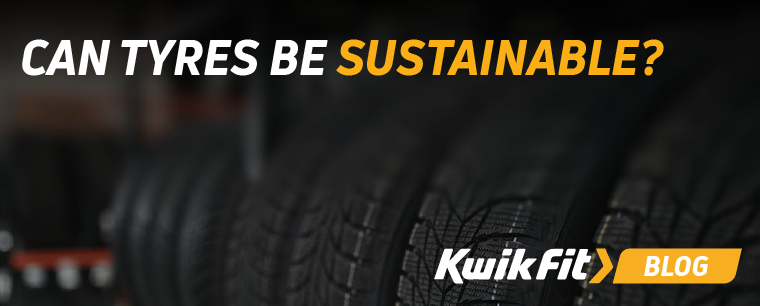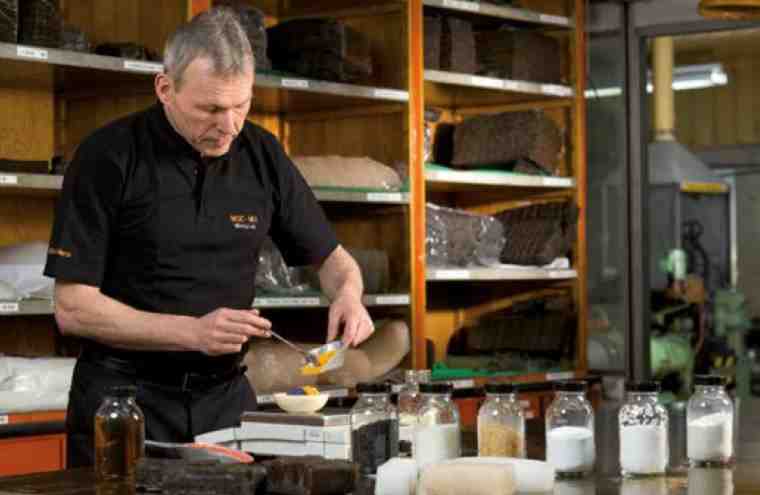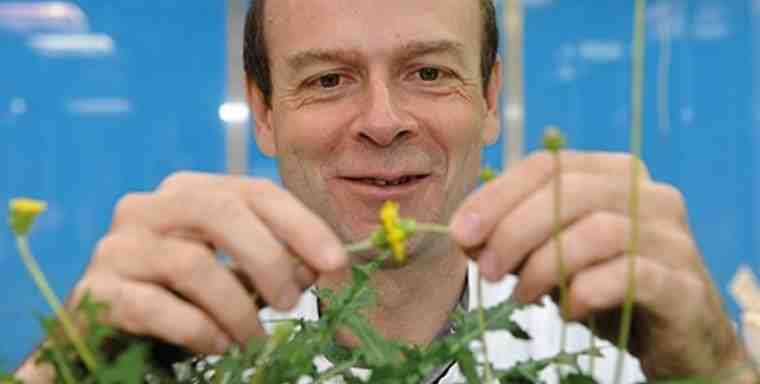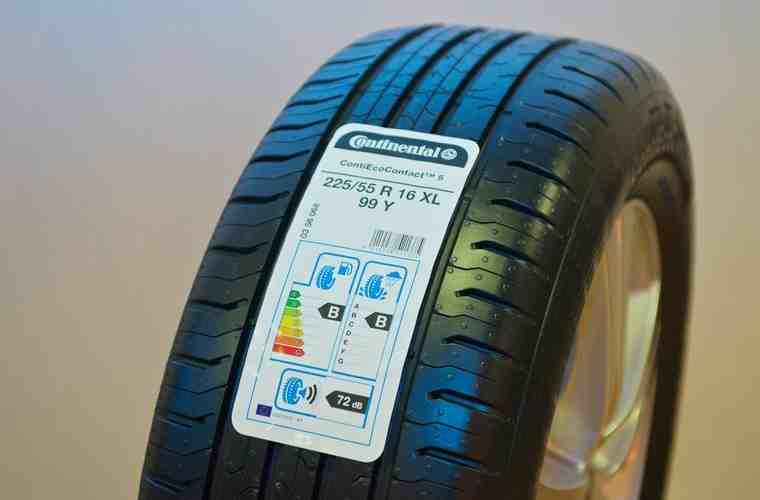Can Tyres Be Sustainable?
Jessica Bird | Sunday 12th October 2025 12:00pm

Sustainability is an essential focus in tyre development, recycling, and technology. And it’s something we care about deeply at Kwik Fit.
Our customers often ask us about the environmental impact of the tyres we sell and the manufacturers we work with. It’s a subject we take seriously, just like our partner, premium tyre manufacturer Continental.
Read on to learn more about the latest developments in sustainable tyre technology. Or, if you’re looking to purchase sustainable tyres from us, find a full breakdown in our blog, “The Eco-Friendly Tyre Options at Kwik Fit”
Can tyres be sustainable?
Tyres - bike, car, van, motorbike, and more - can indeed be sustainable, depending on the materials they are made from, whether they are recycled and disposed of correctly, and their fuel economy and carbon emissions. In this article, we'll run through each of these factors in turn.
Continental's sustainable tyre development
With over 140 years of experience in developing cutting-edge tyre technology, Continental is responsible for introducing the essential tyre treads we now all take for granted. So, it should not come as a shock to learn that Continental are leading the way when it comes to the sustainability of tyres, most notably:
- The reduction of CO2 emissions
- Fuel economy
- And resource conservation.
What happens during sustainable tyre testing?
Continental experts, like Dr. Fred Waldner, are exploring all possible options. His laboratory focuses on the mixing and testing of rubber compounds, which has led to the exploration of some exciting material combinations.

According to Dr Waldner:
“Every year, several thousand samples are produced here, drawing on more than 1,500 different materials. You can’t replace all of the natural rubber in a tyre with synthetic rubber. The technical advantages and unique properties of the natural product are simply too important.
Apply heat to natural rubber and it can be shaped; when it cools down it remains elastic, can be stretched, and will then return to its original shape. The rubber made from this natural product can be elastic or energy absorbing, depending on the composition of the material.”
Can you make tyres out of dandelions?
Fraunhofer Institute for Molecular Biology and Applied Ecology, a natural alternative to rubber, has the potential to be a commercially viable substitute for natural latex from rainforest plantations.
Originally mixed in Dr. Waldner’s lab, and developed in partnership with the Fraunhofer Institute for Molecular Biology and Applied Ecology (IME), dandelion rubber is now being used as an alternative to the natural rubber currently harvested from the world’s rubber tree plantations.
Continental’s innovative sustainable tyre, ‘Urban Taraxagum’, was unveiled at Eurobike 2018, and is the world’s first tyre that features a tread made from pure dandelion rubber.
Why sustainable tyre alternatives matter
For a long time now natural habitats have been under strain, as they have been destroyed to make way for rubber plantations. Initiatives like Continental’s dandelion latex will help to stop the tyre industry from being too reliant on rubber tree plantations, and have a significant impact on reducing the resulting global deforestation.

Are dandelion tyres a viable alternative?
As up to 30% of the rubber used in car tyres currently comes from the plantation tree Hevea Brasiliensis, dandelion rubber could potentially decrease this burden.
The exciting agricultural potential of growing dandelions is that they can be cultivated on land that food crops cannot be planted on, such as that utilised for industrial developments, including tyre manufacturing plants or ‘plantations beside the tyre plants’.
In Europe
In Central Europe, this makes strong economic and ecological sense, with the advantages of this model including significantly reduced transportation distances between material harvesting and material processing. This would lead to a reduction in CO2 emissions during this part of the tyre manufacturing process.
- A further benefit of dandelion planting is that, if we no longer need to enforce monocultures in rainforest regions, the destruction of these vital habitats can be reduced.
In the UK
The ‘plantations beside the tyre plants’ model offers a potential commercial benefit to UK drivers too. By using a more manageable, sustainable alternative material, Continental hopes to experience some immunity from the soaring prices that often occur in the global rubber market. Increased demand often results in an increase in cost, and that ends up affecting all motorists.
Tyre recycling & sustainability
Proper disposal is another crucial factor that impacts tyre sustainability. While it’s essential for premium tyre manufacturers, like Continental, to continue spearheading the quest to achieve sustainable tyres, it’s important to remember that we all have a part to play. As a car owner, you too can make a significant contribution to the challenges facing the environment. A good way to do this is to recycle your tyres.
How can I recycle my tyres?
Every time you buy new tyres from Kwik Fit, we include a small fee for tyre disposal. Your old tyres are then sent to our tyre recycling facility, where they are turned into rubber granulate or rubber crumb, which can be used to make new products - such as artificial sports pitches.
Is it illegal to bin your cars?
Since the introduction of the 2006 EU Landfill Directive, it is illegal to place end-of-life tyres within landfill sites. Instead, all tyres need to be either recycled or reused in some way. Of course, fly-tipping is also not an acceptable way to dispose of tyres.
How are tyres recycled?
The tyre recycling process is fairly challenging, since tyres are made up of different amounts of steel, rubber and textile.
- Firstly, end-of-life tyres are granulated, so as to ensure that the various materials that constitute an individual tyre can be successfully separated.
- Next, the tyres are shredded into what is commonly referred to as ‘rubber crumb’. This core material has many uses, including for the construction of carpet underlay, sports surfaces, pitches and running tracks, children’s playground safety mats, drainage systems, and roof tiles.
- The rubber crumb can also be utilised to create rubberised asphalt road surfaces.

Sustainable tyres that reduce CO2 emissions
Lastly, fuel economy and CO2 emissions are crucial factors that impact tyre sustainability; fitting your car with tyres that have a low rolling resistance is a good way to improve those factors.
Take a look at Continental’s highly regarded ContiEcoContact™ 5, which provides drivers with optimised rolling resistance, without compromising on high braking safety (over short braking distances) on wet roads. This excellent tyre ranks very highly for both fuel efficiency and wet weather braking on the EU Tyre Label.
Speak to Kwik Fit about sustainable tyres
If you’re unsure about sustainable tyres and want to benefit from our expert knowledge, get in contact with one of our tyre professionals. Our dedicated team can provide you with experienced, impartial advice, as well as the best tyre fitting solutions, and more. Find your local Kwik Fit centre today.
Any facts, figures and prices shown in our blog articles are correct at time of publication.
Featured Articles
Is it Illegal to Drive With One Headlight?
Saturday 19th July 2025
Wondering if it’s illegal to drive with one headlight? Learn about the safety risks and penalties of illegal blown bulbs and why you should fix them promptly.
Air Con in EVs & Hybrids: Experts Answer Your Questions
Monday 30th June 2025
Does air con drain EV batteries? Can you use the air con while charging an electric car? Find out the answers to these questions & more from Kwik Fit’s experts.
Why Is Your Car Making a Noise? Fixes & Tips
Friday 13th June 2025
When your car starts making unexpected noises, it can certainly be quite disconcerting; it may be nothing to worry about, but here’s what you need to know.









